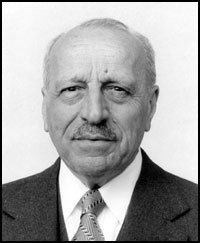Also known as:
George Papanikolaou, Γεώργιος Παπανικολάου
More People of Greece
More Topic Categories
Related Destinations
Georgios Papanikolaou (13/05/1883 - 19/02/1962)
 George Papanikolaou was a famous Greek doctor, biologist and researcher.
George Papanikolaou was a famous Greek doctor, biologist and researcher.He was born in Kymi, Evia, where he completed his primary education. His parents later sent him to Athens, in order to continue his secondary studies; later, he enrolled at the University of Athens, where he studied medicine. Completing his medical degree, he returned to Kymi, regretting that he studied medicine, which he did not want to practice at all. In 1907, he moved to Germany to study biology, before starting his biological research on sex determination in shellfish, at University of Munich. After completing his PhD there, he returned to Athens in 1910 and married Andromache Mavrogeni. In 1911, he went to Monaco and started working at the oceanographic institute there, participating in the team of oceanographic exploration of the Prince of Monaco.
Returning to Greece, he participated in the Balkan Wars; in 1913, he left for USA, where he worked as an assistant at the department of Anatomy of Cornell University. Eventually, he became an associate and finally full professor of anatomy and histology of the Medical School of the University. After researching the degenerative effects of alcohol in guinea pigs, he turned to reproduction issues concerning the function of the genitalia, sex determination, the function of endocrine glands and phyletic hormones. In 1923, he studied the function of the genitalia in women, as well as uterine cancer. His first paper on using the cytological method to diagnose uterine cancer was accepted in 1928, under a lot of skepticism, as at the time it was believed that such a diagnosis was only possible by dissecting the affected organ.
His studies later expanded to include cytological alterations in endometrial cancer, and his findings were published in 1943. This scientific article intrigued doctors worldwide; it wasn’t long before the method was used experimentally in many universities. With his research, Papanikolaou became the founder of a new scientific branch, exfoliative cytology, which was based in the study of cells that were scraped off various cavities of the human body. This method was named in his honour “Papanikolaou Method”, or “Papanikolaou Test”, “Pap Test” for short. In 1954, Papanikolaou published the “Atlas of Exfoliative Cytology”, establishing this new medical practice. All of his publishings, and especially the Atlas, are considered landmarks in the branch of exfoliative cytology and in 20th century medical bibliography, in general. Although he was nominated multiple times for the Nobel Prize by researchers worldwide, he never received it.
Papanikolaou received numerous distinctions, including the Medal of Honor of the American Oncology Society in 1952. Today, the Pap test is used worldwide to diagnose uterine cancer and other cytological diseases of the female reproductive system.
See Also:
 Athens Photos
Athens Photos
 Santorini Photos
Santorini Photos
 Crete Photos
Crete Photos
 Meteora Photos
Meteora Photos
 Corfu Photos
Corfu Photos



